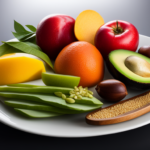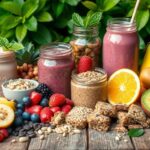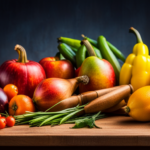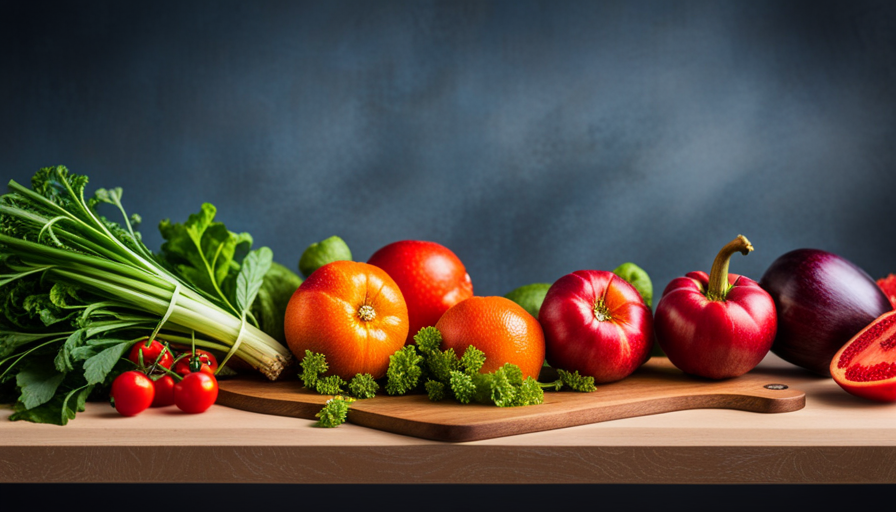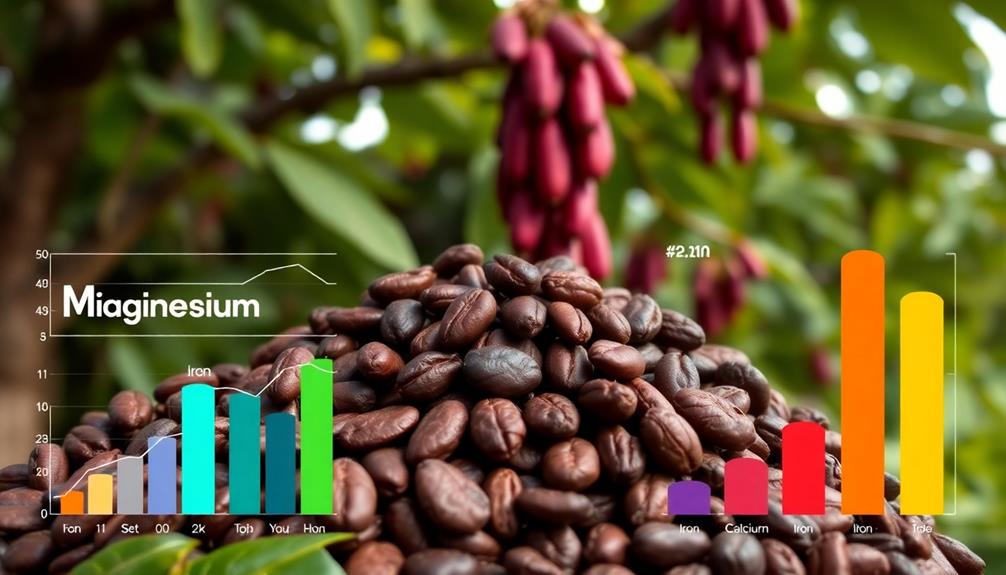Tired of the misconception that a raw food diet is only for losing weight? Let’s debunk that myth and show how a raw food diet can also assist in gaining weight.
Yes, you heard it right! Contrary to popular belief, a raw food diet can be a powerful tool for weight gain, if done correctly.
Now, you might be wondering how this is even possible. How can eating raw fruits, vegetables, and nuts help you pack on the pounds? Well, the key lies in understanding the principles of a raw food diet and making the right choices to meet your weight gain goals.
In this article, we will guide you through the process of gaining weight on a raw food diet. We will explore strategies such as setting realistic weight gain goals, tracking your caloric intake, incorporating protein-rich foods, balancing macronutrients, incorporating strength training, avoiding excessive cardio, and getting sufficient rest and recovery.
By following these evidence-based techniques, you can achieve your desired weight on a raw food diet while nourishing your body with wholesome, nutrient-dense foods.
So let’s dive in and discover the secrets to gaining weight the raw food way!
Key Takeaways
- Raw food diet can be used for weight gain by incorporating high-calorie raw foods.
- Balancing macronutrients, including protein and carbohydrates, is crucial for weight gain on a raw food diet.
- Including healthy fats from nuts, seeds, and avocados is important for calorie intake and weight gain.
- Strength training exercises, such as squats and deadlifts, can promote muscle growth on a raw food diet.
Understanding the Raw Food Diet
If you’re looking to gain weight on a raw food diet, understanding the ins and outs of this dietary approach is crucial. While the raw food diet is typically associated with weight loss, it is possible to gain weight by following this lifestyle with the right approach.
One of the benefits of a raw food diet is that it consists of whole, unprocessed foods that are rich in nutrients. Fruits, vegetables, nuts, and seeds are packed with vitamins, minerals, and antioxidants that can support overall health and weight gain. Additionally, raw food diets often exclude processed foods, which can be high in unhealthy fats and sugars that contribute to weight gain.
However, there are common misconceptions about raw food diets that may hinder weight gain. Some people believe that raw food diets are low in calories, making it difficult to consume enough to gain weight. However, by incorporating high-calorie raw foods such as avocados, nuts, and nut butters, it’s possible to increase calorie intake and promote weight gain. It’s also important to ensure a balanced diet that includes a variety of fruits, vegetables, and plant-based proteins to support muscle growth and overall health.
Gaining weight on a raw food diet is possible by understanding the benefits of this dietary approach and addressing common misconceptions. By incorporating nutrient-dense, high-calorie foods and ensuring a balanced diet, you can achieve your weight gain goals while maintaining the health benefits of a raw food lifestyle.
Setting Realistic Weight Gain Goals
When setting realistic goals for your journey, it’s like planning a road trip – you need to have a clear destination in mind and map out the steps to get there. In the case of gaining weight on a raw food diet, it’s important to set achievable expectations and maintain consistent progress. Here is a table that can help you visualize your weight gain goals:
| Goal | Timeframe | Expected Weight Gain |
|---|---|---|
| Short-term | 1 month | 2-4 pounds |
| Medium-term | 3 months | 6-12 pounds |
| Long-term | 6 months | 12-24 pounds |
| Ultimate | 1 year | 20-40 pounds |
Remember, these numbers are just estimates and individual results may vary. It’s essential to listen to your body and make adjustments as needed. To maintain consistent progress, focus on increasing your calorie intake with nutrient-dense foods like avocados, nuts, seeds, and healthy fats. Additionally, consider incorporating strength training exercises to build muscle mass. Keep in mind that weight gain is a gradual process, and it’s important to be patient with yourself. Celebrate small victories along the way and stay committed to your goals.
Tracking Your Caloric Intake
To effectively track your caloric intake, you can visualize your progress by keeping a daily log of the nutrient-rich foods you consume and their corresponding calorie counts. This simple practice can help you stay aware of how much you’re eating and ensure you’re getting enough calories to support weight gain on a raw food diet.
Importance of portion control can’t be overstated. While raw foods are generally lower in calories compared to their cooked counterparts, it’s still important to pay attention to portion sizes. Consuming large quantities of high-calorie raw foods like nuts, seeds, and avocados can easily lead to weight gain. By tracking your caloric intake, you can maintain portion control and make adjustments as needed.
Another benefit of meal planning is that it allows you to ensure you’re getting a balanced mix of macronutrients and micronutrients. This is especially important when you’re trying to gain weight on a raw food diet. By planning your meals in advance, you can make sure you’re including a variety of fruits, vegetables, nuts, seeds, and other nutrient-rich foods that provide the necessary calories for weight gain.
By tracking your caloric intake and incorporating portion control and meal planning, you can effectively gain weight on a raw food diet while still ensuring you’re consuming a balanced and nutritious diet.
Incorporating Protein-Rich Foods
Incorporating protein-rich foods into your meals ensures that you’re nourishing your body with the building blocks it needs to support muscle growth and repair.
When following a raw food diet, it’s essential to choose plant-based protein sources that are easy to digest. Some excellent options include nuts, seeds, legumes, and leafy greens.
Nuts and seeds are packed with protein and healthy fats. Almonds, walnuts, chia seeds, and flaxseeds are great choices that can be added to smoothies, salads, or homemade energy bars.
Legumes, such as chickpeas and lentils, are also rich in protein and can be included in soups, stews, or as a base for veggie burgers.
Leafy greens might not be the first thing that comes to mind when thinking about protein, but they actually contain a surprising amount. Spinach, kale, and broccoli are excellent sources of plant-based protein and can be enjoyed in salads or cooked dishes.
Meal planning is crucial when trying to gain weight on a raw food diet. Make sure to include a variety of protein-rich foods in your meals to ensure you’re meeting your daily requirements. Experiment with different recipes and combinations to keep your meals exciting and satisfying. Remember to listen to your body and adjust your protein intake based on your individual needs.
Balancing Macronutrients
Achieving a well-rounded nutritional profile involves finding the right balance of macronutrients in your meals. When you’re trying to gain weight on a raw food diet, it’s essential to include protein sources and carbohydrate sources in your daily intake.
Protein sources are crucial for muscle growth and repair. Incorporate foods like hemp seeds, chia seeds, and spirulina into your diet. These plant-based protein sources aren’t just rich in essential amino acids but also provide other essential nutrients like omega-3 fatty acids and iron.
Carbohydrate sources are important for providing energy and supporting weight gain. Include fruits like bananas, dates, and mangoes, which are high in natural sugars and can help boost calorie intake. Additionally, starchy vegetables like sweet potatoes and yams are excellent sources of carbohydrates and can be included in your meals.
Remember, balance is key. Make sure to include a variety of protein and carbohydrate sources in your diet to ensure you’re getting a wide range of nutrients. Don’t be afraid to experiment with different recipes and meal combinations to find what works best for you. With the right balance of macronutrients, gaining weight on a raw food diet is definitely achievable.
Including Healthy Fats in Your Diet
Including healthy fats in your meals is essential for maintaining a balanced nutritional profile and supporting overall health. Studies have shown that consuming an adequate amount of healthy fats can help improve cognitive function and reduce the risk of chronic diseases.
When following a raw food diet, it’s important to ensure you’re getting enough healthy fats to meet your daily calorie needs and promote weight gain.
One of the best sources of healthy fats on a raw food diet is nuts and seeds. These nutrient-dense foods are packed with monounsaturated and polyunsaturated fats, which are beneficial for heart health and can help increase calorie intake. Incorporating a variety of nuts and seeds such as almonds, walnuts, flaxseeds, and chia seeds into your meals and snacks can provide you with a good amount of healthy fats.
Avocados are another excellent source of healthy fats on a raw food diet. They’re rich in monounsaturated fats, which can help maintain healthy cholesterol levels and support weight gain. Adding sliced avocados to your salads, blending them into smoothies, or using them as a spread on raw food wraps can be a delicious way to include healthy fats in your diet.
Including healthy fats in your raw food diet is crucial for maintaining a balanced nutritional profile and promoting weight gain. Nuts, seeds, and avocados are all excellent sources of healthy fats that can be easily incorporated into your meals and snacks.
Incorporating Strength Training
To build muscle and improve overall fitness, it’s essential to add strength training to your workout routine. Strength training involves using resistance exercises to challenge your muscles and promote muscle growth. By incorporating effective exercises into your routine, you can build muscle mass and achieve your weight gain goals on a raw food diet.
Here are some effective exercises to incorporate into your strength training routine:
-
Squats: Squats are a compound exercise that targets multiple muscle groups, including your quadriceps, hamstrings, and glutes. They help to increase lower body strength and build muscle mass.
-
Deadlifts: Deadlifts are another compound exercise that targets various muscles, including your back, legs, and core. They are great for building overall strength and promoting muscle growth.
-
Bench Press: The bench press is a popular exercise that targets your chest, shoulders, and triceps. It’s an effective way to build upper body strength and increase muscle mass.
By incorporating these exercises into your strength training routine, you can effectively build muscle mass and achieve your weight gain goals on a raw food diet. Remember to start with lighter weights and gradually increase the resistance as you become stronger.
Avoiding Excessive Cardio
Don’t even think about going overboard with cardio if you want to see any progress. While cardiovascular exercise is important for overall health, when it comes to gaining weight on a raw food diet, excessive cardio can hinder your progress.
Cardio workouts burn a lot of calories and can make it difficult to consume enough to support weight gain. Instead of spending hours on the treadmill or running long distances, focus on alternative forms of exercise that’ll help you achieve your goals.
One way to avoid overtraining is to incorporate strength training into your routine. This type of exercise not only builds muscle, but it also increases your metabolism, allowing you to consume more calories without gaining excess fat. Strength training exercises like squats, deadlifts, and bench presses can be done with free weights or machines at the gym, or even with bodyweight exercises at home. Aim for two to three strength training sessions per week, focusing on different muscle groups each time.
In addition to strength training, consider incorporating other forms of exercise that promote muscle growth without excessive calorie burn. Yoga, Pilates, and resistance band workouts are all great options. These exercises help improve flexibility, balance, and core strength, while still allowing you to conserve energy for muscle growth.
By finding alternative forms of exercise and avoiding excessive cardio, you can maximize your chances of gaining weight on a raw food diet.
Getting Sufficient Rest and Recovery
Rest and recovery are crucial for achieving optimal results in any fitness routine. It allows your body to repair and rebuild muscles, boost energy levels, and enhance overall performance.
When following a raw food diet, getting sufficient rest becomes even more important as your body may need additional time to heal and adapt to the new dietary changes.
One of the most important aspects of rest and recovery is getting enough sleep. Sleep is when your body goes into repair mode, releasing growth hormones and repairing damaged tissues. Aim for 7-9 hours of uninterrupted sleep each night to support your body’s recovery process.
In addition to sleep, there are other rest and recovery tips you can incorporate into your routine. Firstly, listen to your body and take rest days when needed. Overtraining can lead to fatigue and hinder progress. Secondly, try incorporating relaxation techniques such as meditation or yoga. These practices can help reduce stress and promote relaxation, allowing your body to recover more effectively.
Lastly, don’t forget to prioritize nutrition during the recovery process. Include nutrient-dense foods in your raw food diet to provide your body with the necessary building blocks for repair and recovery.
By giving your body the rest and recovery it needs, you can maximize the benefits of your raw food diet and achieve your weight gain goals more effectively.
Consulting with a Nutritionist or Dietitian
Consider seeking guidance from a nutritionist or dietitian to ensure that you’re properly nourishing your body and optimizing your overall health while following this lifestyle. Consulting with a professional can provide numerous benefits and help you make informed decisions about your diet and weight gain goals. Here are four reasons why consulting with a nutritionist or dietitian can be beneficial:
-
Personalized guidance: A nutritionist or dietitian can assess your individual needs, preferences, and goals to create a tailored plan. They can help you determine the right calorie intake, macro and micronutrient balance, and advise you on suitable food choices.
-
Expert knowledge: These professionals have extensive knowledge of nutrition and can provide evidence-based recommendations. They stay updated with the latest research, ensuring that you receive accurate information about how to gain weight healthily on a raw food diet.
-
Accountability and support: A nutritionist or dietitian can offer ongoing support and accountability, helping you stay on track with your weight gain goals. They can provide motivation, answer questions, and address any concerns you may have along the way.
-
Finding the right dietitian: When seeking guidance, it’s important to find a nutritionist or dietitian who specializes in raw food diets and weight gain. Look for someone with experience in this area and positive reviews from previous clients.
By consulting with a nutritionist or dietitian, you can ensure that you’re nourishing your body properly and receiving expert guidance on how to effectively gain weight on a raw food diet.
Frequently Asked Questions
Can I still eat cooked food on a raw food diet to gain weight?
Yes, you can still eat cooked food on a raw food diet to gain weight. In fact, incorporating cooked foods can be helpful in increasing calorie intake.
One interesting statistic to consider is that cooking techniques like steaming or baking can increase the bioavailability of certain nutrients in vegetables.
To incorporate cooked foods into your raw food diet, you can include steamed vegetables, baked sweet potatoes, or grilled tofu. These options provide additional calories and nutrients while still maintaining the principles of a raw food diet.
How can I ensure I am getting enough vitamins and minerals on a raw food diet for weight gain?
To ensure you’re getting enough vitamins and minerals on a raw food diet, focus on overcoming nutritional challenges and balancing macronutrients. Raw food diets can sometimes be lacking in certain nutrients, so it’s important to include a variety of fruits, vegetables, nuts, and seeds to meet your nutritional needs. Additionally, consider incorporating seaweed, fermented foods, and sprouted grains for added nutrients. Consulting with a registered dietitian can also be helpful in designing a well-rounded raw food meal plan to support weight gain.
Are there any specific raw food recipes or meal plans that can help me gain weight?
Looking to bulk up on a raw food diet? You’re in luck! Raw food meal prep can be your secret weapon. Whip up nutrient-packed meals like raw veggie stir-fries or zucchini noodles with avocado sauce.
For those midday cravings, reach for raw food snacks for weight gain like energy balls made with dates, nuts, and seeds. These tasty treats aren’t just delicious but also filled with healthy fats and protein to support your weight gain journey.
Can I still eat carbohydrates on a raw food diet for weight gain?
Yes, you can still eat carbohydrates on a raw food diet for weight gain. Carbohydrates are an important macronutrient that provide energy and help fuel your body. While raw food diets often focus on fruits, vegetables, and nuts, you can still incorporate carbohydrates into your meals. Opt for whole food sources like sweet potatoes, quinoa, and brown rice. These options are nutrient-dense and can support weight gain when combined with other high-calorie foods.
Are there any supplements that can help me gain weight on a raw food diet?
Looking to gain weight on a raw food diet? Wondering if there are supplements that can help? Well, here’s the deal: raw food diets focus on natural, unprocessed foods, while traditional weight gain supplements often contain additives and artificial ingredients.
When it comes to protein intake, raw food diets can provide ample amounts through sources like nuts, seeds, and legumes. So, skip the supplements and opt for a well-balanced raw food diet to support your weight gain goals naturally.
Does a Raw Food Diet Provide Enough Nutrients to Support Weight Gain?
While a raw food diet is often associated with weight loss, gaining weight with raw food is possible by increasing calorie-dense options like nuts, seeds, avocados, and coconut. Incorporating a variety of proteins, healthy fats, and carbohydrates can help ensure sufficient nutrient intake to support weight gain with raw food.
Conclusion
In conclusion, gaining weight on a raw food diet requires careful planning and attention to your caloric intake and macronutrient balance. Incorporating protein-rich foods, such as nuts, seeds, and legumes, can help support muscle growth. Additionally, engaging in strength training exercises can help build lean body mass. It’s important to avoid excessive cardio, as this can burn more calories than you consume. Getting sufficient rest and recovery is also crucial for weight gain. Lastly, consulting with a nutritionist or dietitian can provide personalized guidance and support on your weight gain journey.
Did you know that a raw food diet can increase your nutrient intake by up to 50% compared to a cooked food diet? This means that you can nourish your body while still achieving your weight gain goals.



